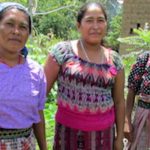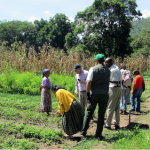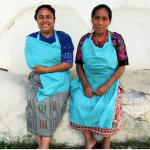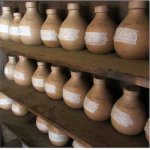Action Learning in Latin America and the Caribbean
Since the last regional meeting in Brazil, our Latin America and Caribbean (LAC) partners have taken a great stride to consolidate a regional program, through an action-learning framework that provides a common “roadmap” yet celebrates the diversity of agroecological and institutional innovations emerging in the LAC region. From August 29 to September 2, 2016, partners convened in the small town of Rabinal, Guatemala to: (1) share country-level accomplishments since Brazil; (2) assess changes in national contexts and as LAC region; and (3) develop a plan of action with our new Regional Coordinator, Alejandra Arce Indacochea. The meeting was hosted by the Achi-Mayan led grassroots organization Qachuu Aloom, which joined Groundswell´s LAC action-learning community in 2015.
Leaders from EkoRural (Ecuador), Partenariat pour le Developpement Local (Haiti), Vecinos Honduras (Honduras), Qachuu Aloom (Guatemala), the National Network for the Defense of Guatemalan Food Sovereignty (REDSAG) and Groundswell International were gathered as part of the Groundswell-led coalition that began in 2009. Groundswell and LAC partners have been playing a key role in advancing people-centered, agroecological development in this mega-biodiverse, aquifer-rich and multi-ethnic region of the world. The collective Latin America and Caribbean experience has invaluable lessons to share with the global-wide effort to shift from an “upside-down world” (Galeano 2001) to a just, sustainable, human-scale development paradigm.
One common priority area that LAC partners identified during the conference was the urgent need to turn food systems from unhealthy, dysfunctional, vertically-driven processes toward healthy, local, horizontally-driven networks. Food systems are made up of farmers, consumers (both rural and urban), and market structures at multiple scales; and have a direct impact on the environment and human health. They are also ubiquitous and a “common denominator” across the LAC region´s vindications of social and ecological justice. Partners exchanged their courageous and promising advances to tackle their food system problems from different angles, despite deep, structural challenges.
EkoRural, for instance, is pioneering the formation of producer-consumer networks – the “Canastas Comunitarias” initiative – that reach low-income urban consumers while fairly compensating agroecological farmers for their hard labor and ecological services in the southern and central Andes of Ecuador.
Partenariat pour le Developpement Local is working with 16 farmer organizations that produce locally-adapted rice varieties, maize, cassava, peanut, and sugarcane; and four (4) farmer-initiated micro-processing enterprises that transform these crops to value-added products, then distribute and sell them within local farmer and consumer networks across five (5) municipalities in north and north-eastern Haiti.
Vecinos Honduras has demonstrated the economic advantages of ecologically-grown shaded coffee over mining activities, and works with 120 coffee-growing families to sell their agroecological product through a cooperative-oriented collective in southern Honduras.
As first-time host in the LAC region, Qachuu Aloom shared the story of its 500-member organization, mostly indigenous women. Meaning “Mother Earth” in the Achi-Mayan language, Qachuu Aloom began its work in 2003 as an indigenous farmer organization committed to healing the planet, conserving local seeds, creating job opportunities, and fostering local food economies across Baja Verapaz, Guatemala.
From its beginnings promoting organic soil-restoring practices in six communities, Qachuu Aloom now supports 27 communities across five programs:
local management and conservation of seeds (mostly amaranth and pigeon-pea varieties);
agroecological production (amaranth seed beds and homegardens);
maternal-child nutrition;
transformation of seeds into value-added products;
and local marketing circuits.
In a spirit of camaraderie and learning, LAC partners spent one field-day getting to know Qachuu Aloom´s work – from the cultivated fields of Doña Florencia Toj; to the community seed bank under the custodianship of Doña Basilia Alvarado; to the processing center K’amb’al Na’oj, where three very knowledgeable and tech-savvy women manage and transform the various seeds (amaranth, pigeon-pea, pumpkin, maize) brought by their members into highly nutritious flours and protein-rich, native grain bars.
As is usually the case in these events, agendas are ambitious and time literally flies. Yet much was accomplished, and the groundwork has been laid for a robust LAC program strategy with “impact pathways” for effective systemic change. This means, essentially, articulating what happens on the field (the “micro”) with new market configurations (the “meso”), and the functional institutional ecosystems and coherent policies that support them (the “macro”).
IMAGES:
Groundswell’s partners from Latin American and the Caribbean
lac-collage
For more on this story go to: http://www.groundswellinternational.org/ecuador/action-learning-in-latin-america-and-the-caribbean/










